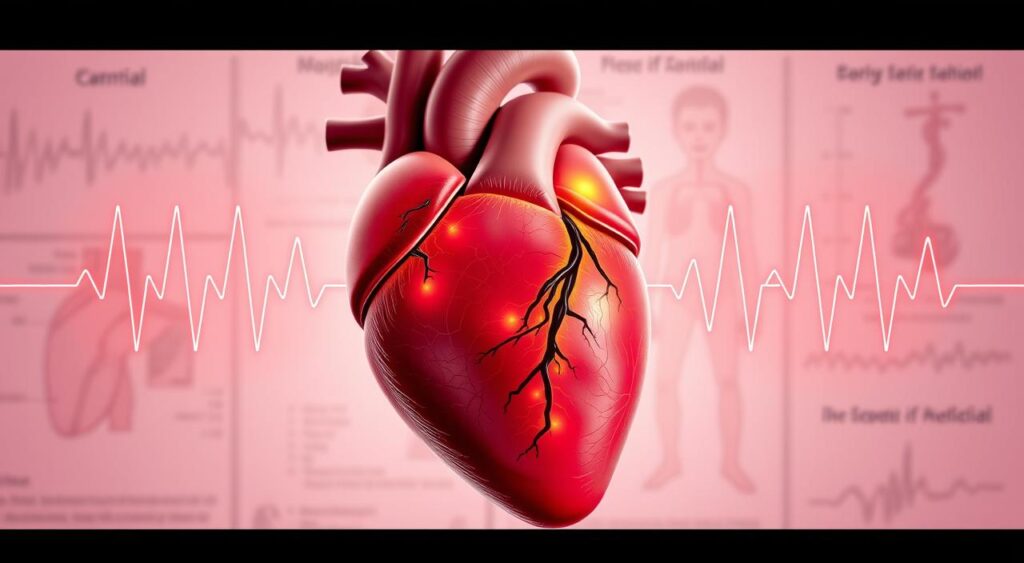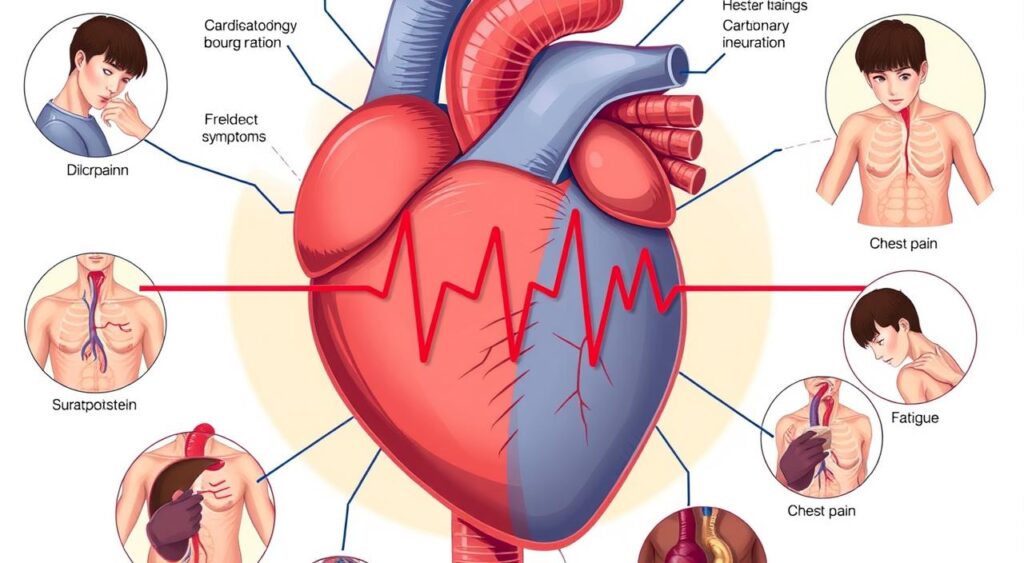Did you know that around 2.7 million Americans live with an irregular heartbeat? This makes it one of the most common heart concerns. These conditions can interrupt normal blood flow and put people at risk for serious complications.
Cardiac arrhythmias happen when electrical signals in the heart go off track. Detection and proper care play a key role in avoiding lasting damage and improving quality of life. Specialists recommend learning the signs and seeking professional advice, especially if symptoms become frequent or intense.

Key Takeaways
- Many individuals live with an irregular heartbeat without noticing warning signs.
- Some arrhythmias can increase the likelihood of stroke and heart failure.
- Lifestyle adjustments may lower the risk of dangerous heart rhythms.
- Stress management supports steadier heart function.
- Early detection and medical guidance help maintain healthier cardiac rhythms.
What Are Cardiac Arrhythmias?
Cardiac arrhythmias occur when the heart’s electrical signals get mixed up. This can make the heart beat too fast or too slow. It affects how well blood flows and how you feel overall.
These issues include things like irregular heartbeats, fast heart rates, and slow heart rates. Experts call these problems heart rhythm disorders. They can cause anything from mild fluttering to severe chest pain.
Every heartbeat needs a precise electrical signal. This signal makes the heart’s chambers contract at the right time. If this timing gets off, you might feel your heart skipping beats, get tired easily, or feel dizzy.
Some heart rhythm problems don’t bother you much. But others can be serious. The American Heart Association says:
“Maintaining a steady heartbeat is critical for balanced circulation and long-term heart health.”
Knowing about these issues helps you spot warning signs. It also encourages you to get the right care for heart rhythm disorders.
How the Heart Produces Its Rhythm
The human heart needs a precise electrical system to keep blood flowing. Special cells send out impulses in a timely manner. Any irregular heartbeat might mean a problem with these signals.
Normal Electrical Conduction in the Heart
The SA node starts this electrical process. It sends signals that make the atria contract and push blood into the ventricles. The signal then pauses at the atrioventricular node, allowing the ventricles to fill properly before moving on.
This careful timing helps the heart beat efficiently.
Key Heart Structures and Their Roles
Atria collect blood from the body or lungs. Ventricles then pump it to important organs through arteries. Valves between these chambers ensure blood flows only one way, preventing backflow.
Each part works together with the electrical system for a steady rhythm.
Overview of Types of Arrhythmias
Some arrhythmias, like supraventricular tachycardia, involve fast heart rates. Others, like atrial fibrillation, cause chaotic signals leading to an irregular heartbeat. Slow patterns, or bradyarrhythmias, make the heart pump less efficiently.
Each type shows a problem with the heart’s normal electrical cycle.
Common Cardiac Arrhythmia Causes
Heart rhythm problems often come from our daily habits or family history. Many find that simple choices greatly affect their heart health. Knowing what triggers these issues can help us make safer choices and find better treatments.
Lifestyle Factors and Stress
Bad diets, too much caffeine, and smoking can mess with heart signals. Not being active enough makes it harder for the body to handle heart rate changes. Stress can also raise blood pressure and cause irregular heartbeats. Spotting these factors helps us make better lifestyle choices for our heart.
Genetic and Underlying Medical Conditions
People with a family history of heart problems might be more at risk. Medical issues like diabetes or high blood pressure can also affect the heart. Certain imbalances in electrolytes can further disrupt heartbeats. Recognizing these risks early helps in creating effective treatment plans.
| Common Factors | Possible Effects | Preventive Steps |
|---|---|---|
| Smoking | Heightened Heart Strain | Quit Programs |
| Excess Caffeine | Increased Palpitations | Moderate Intake |
| Family History | Higher Susceptibility | Routine Screenings |
Recognizing Symptoms of an Irregular Heartbeat
Some irregular heart rhythms show up as fluttering in the chest or spells of dizziness. Others might cause fatigue or occasional fainting. The signs can vary because different arrhythmias affect heart rate differently.
Fluttering usually means a faster heartbeat, while a slow rate can make you feel weak. Shortness of breath or mild chest discomfort can also occur. It’s important to catch these signs early because they might signal bigger problems.
Some arrhythmias don’t show symptoms for a long time. That’s why noticing any unusual pulse patterns is crucial. Getting a doctor’s opinion is key to figuring out if your heartbeat is irregular.

| Symptom | Possible Meaning |
|---|---|
| Palpitations | May point to a racing heartbeat |
| Dizziness | Might signal reduced blood flow |
| Fatigue | Could mean inadequate oxygen supply |
| Fainting | Warning of unstable heart rate |
Advanced Arrhythmia Diagnosis and Monitoring
Finding the exact cause of an irregular heartbeat needs special tools and methods. Doctors collect detailed data on heart rhythms. This helps them find where problems start and how they change over time.
Advanced tools like ambulatory devices are used for days or weeks. These devices record every heartbeat. They help doctors catch rare, intermittent signals.
Holter Monitors and Event Recorders
A Holter monitor is worn for 24 to 48 hours. An event recorder is used for longer periods. Both find subtle patterns to uncover arrhythmia causes. Doctors look at these findings to see if they match symptoms like faintness or palpitations.
Electrophysiological Studies Explained
This method uses fine catheters in the heart to map electrical pathways. Specialists study how signals move through the heart. They find irregular spots that might cause arrhythmias. This helps guide treatment and understand each patient’s risks.
Effective Arrhythmia Treatment Options
Getting a steady heart rhythm often means a plan made just for you. Doctors might suggest medicines like beta-blockers or antiarrhythmic drugs. These help keep the heart rhythm steady. Sometimes, a specific procedure is needed to fix the problem and prevent future issues.
- Beta-blockers or antiarrhythmic drugs can help manage abnormal heart rates.
- Electrical cardioversion delivers a controlled shock to reset the heartbeat.
- Catheter ablation pinpoints and neutralizes problematic tissue.
- Pacemakers or defibrillators provide ongoing support for certain arrhythmias.
“Discussing treatment strategies with a specialized cardiologist is an important step toward long-term relief.”
Each treatment aims to lessen the symptoms of arrhythmia and protect the heart. Looking at all options helps patients make informed choices with their doctors.

Choosing the best treatment involves tests and expert advice. This ensures the plan is tailored to your needs for better heart health.
Lifestyle Strategies for Arrhythmia Management
Daily habits are key to heart health. Many use their arrhythmia diagnosis to change their routines. Eating right and staying active keeps the heart in rhythm.
Keeping a healthy weight is important. Foods full of fiber, vitamins, and lean protein help the heart. Drinking enough water also boosts heart health.
Diet and Exercise Considerations
Stay away from high-sodium snacks and sugary drinks. They can harm the heart. Instead, eat lean fish, whole grains, and veggies. Activities like brisk walking or group workouts are great for all levels.
- Consult a healthcare provider before changing your exercise plan
- Track sodium intake and opt for fresh, unprocessed options
Stress Reduction Techniques
Too much stress can mess with heart rhythms. Relaxation techniques help. Deep breathing and meditation calm the heart. Group classes can keep you motivated.
“We have found that reducing daily stress levels supports stable heart rhythms.” – American Heart Association
Combining these strategies with regular check-ups works best. Keeping up with your arrhythmia diagnosis leads to better results.
| Focus | Recommended Action |
|---|---|
| Diet | Choose fresh produce and limit excess salt |
| Exercise | Incorporate moderate routines approved by a health professional |
| Stress Relief | Include mindfulness sessions and restful sleep |
Top Tips for Arrhythmia Prevention
Starting early with protective measures can greatly improve heart health. Simple lifestyle changes and regular medical check-ups are key. Together, they form a strong base for long-term health.
Importance of Routine Checkups and Screenings
Regular heart checks can catch issues before they get worse. Annual tests like EKGs or stress tests are crucial. They help doctors take early action to keep your heart rhythm steady.
Managing Risk Factors Effectively
Keeping blood pressure and cholesterol in check is vital. Regular exercise, healthy eating, and managing weight also help. Sometimes, doctors may suggest specific treatments to reduce risk, making arrhythmia management easier.
Conclusion
Spotting irregular heart rhythms early is crucial for your health. Talking to doctors you trust is important. The American Heart Association has many tips on preventing arrhythmia.
Regular health checks can uncover problems early. Quick action can lead to better outcomes.
Keeping a daily routine is key. Eating well, exercising right, and managing stress are essential. Drinking moderate amounts of caffeine and getting enough sleep also help.
New monitoring tools offer hope for better understanding. Early treatment and healthy living can reduce complications. These steps help keep your heart steady and improve your outlook.
FAQ
Q: What are cardiac arrhythmias?
A: Cardiac arrhythmias are heart rhythm disorders. They make the heart beat too fast, too slow, or irregularly. The American Heart Association says they can be harmless or serious.
Q: Which factors contribute to cardiac arrhythmia causes?
A: Damage to the heart, high blood pressure, diabetes, and imbalances in electrolytes are common causes. Lifestyle choices like smoking, too much caffeine, and stress can also cause irregular heartbeats. Family history is another factor.
Q: What are the main types of arrhythmias?
A: There are several types, including SVT, ventricular tachycardias, atrial fibrillation, and bradyarrhythmias. Each type has its own causes and symptoms. Getting a proper medical evaluation is important to identify the specific condition.
Q: How is an arrhythmia diagnosis typically made?
A: Doctors start with tests like electrocardiograms (ECGs). They might use Holter monitors or event recorders for ongoing tracking. In some cases, they perform electrophysiological studies at places like the Mayo Clinic.
Q: What are common arrhythmia treatment options?
A: Treatments include medications like beta-blockers or antiarrhythmic drugs. For complex cases, procedures like catheter ablation or the implantation of a pacemaker or ICD may be needed.
Q: Can arrhythmia management be supported through lifestyle changes?
A: Yes. A balanced diet, approved exercise, and stress-reduction techniques like yoga can help. Avoiding caffeine, alcohol, and tobacco is also important.
Q: How can one practice arrhythmia prevention?
A: Preventive strategies include regular checkups, especially for those with high blood pressure or heart disease in their family. A heart-healthy lifestyle, including nutritious foods and exercise, is also key.
Q: Are all heart rhythm disorders permanent?
A: No, not all are permanent. Some arrhythmias are temporary or caused by specific factors. Others can be chronic but controlled with the right treatment. Getting professional advice is important for each patient’s situation.
